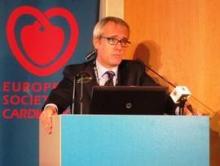MUNICH – Patients who resume smoking after an ischemic stroke raise their risk of dying by roughly threefold within 1 year, a prospective, observational study has shown.
Moreover, the risk of dying increases the sooner the relapse occurs. Patients who resume smoking within 10 days of leaving the hospital are five times more likely to die within a year than are those who remain smoke free.
"Smoking relapse is extremely dangerous after an acute ischemic stroke," said Dr. Furio Colivicchi of the cardiovascular department at San Filippo Neri Hospital, Rome.
Cardiologists at San Filippo, in collaboration with neurologists from the Santa Lucia Foundation of Rome, enrolled 921 consecutive active smokers who ceased smoking after admission to the hospital for acute ischemic stroke and reported being motivated to continue abstaining once discharged.
All patients received a brief in-hospital smoking cessation counseling session lasting 5-20 minutes and delivered by trained nurses (73%) or physicians (27%).
Patients did not receive any specific postdischarge support or pharmacotherapy for smoking cessation. One-third of patients (34%), however, were referred to a hospital-based rehabilitation program after their stroke.
The cohort of 584 men and 337 women had an average National Institutes of Health Stroke Scale score of 9.1, 11% had had a previous stroke, 18% had a previous myocardial infarction, 69% had hypertension, and 20% were obese. Their average age was 67 years.
During the 12-month follow-up, 54% of all patients resumed regular cigarette smoking, with 50% relapsing within 3 weeks of discharge, Dr. Colivicchi reported at the annual congress of the European Society of Cardiology.
Patients who relapsed were significantly more likely to be older (69 years vs. 65 years) and female (44% vs. 28%), and were less likely to do so if referred to a hospital-based stroke rehabilitation program (25% vs. 44%), all highly significant differences.
During the 12-month follow-up, 89 patients (9.7%) died. Most of the deaths were due to ischemic events, both coronary and stroke recurrences, Dr. Colivicchi told the media at the meeting.
"The causal link between smoke and further ischemic events is complex," he said. "But we do know that smoking has a negative impact on the cardiovascular system, and it increases the ability of the platelets to aggregate, for instance, which is a crucial point in these ischemic syndromes."
After adjustment for confounding interactions including clinical variables and variables related to the acute event, a strong relationship was found between smoking relapse and all-cause mortality, Dr. Colivicchi said. The risk of death was 5.1-fold higher at 10 days, 3.8-fold higher at 120 days, and 2.6-fold higher at roughly 1 year.
A linear correlation exists between the number of cigarettes and the probability of suffering an acute cardiovascular event, but even small amounts, such as fewer than five cigarettes per day, have been linked to increased cardiovascular events, he noted. Most of the patients in the study were heavy smokers, smoking more than 10 cigarettes per day prior to the index event and typically relapsing to their original amount.
"We must be very careful and provide a more comprehensive approach because individual counseling is not fully effective if it is not followed by postdischarge support for this specific problem and possibly, in selected cases, by pharmacological treatment aimed at reducing the risk of relapse," he said.
A recent study in 4,834 patients with acute coronary syndrome (ACS) reported that while 20% were smokers at the time of their ACS, only 24% received any smoking intervention from their general practitioner within 3 months of the event. Of these, 9% received advice only and 15% received pharmacological intervention (Eur. J. Prev. Cardiol. 2012 Sept. 5 [epub ahead of print]).
Dr. Colivicchi reported no relevant financial conflicts.


